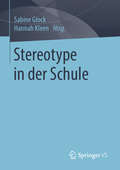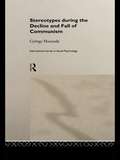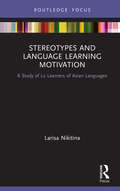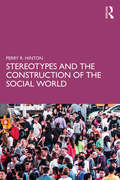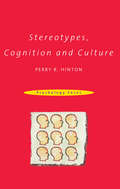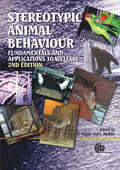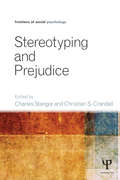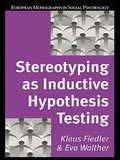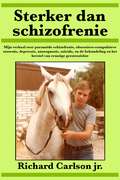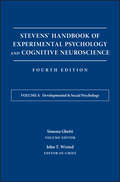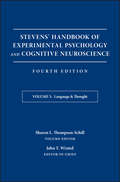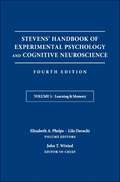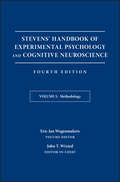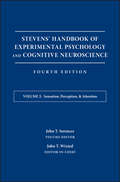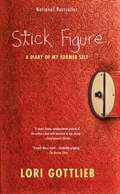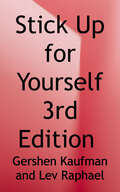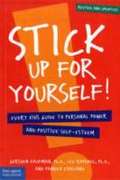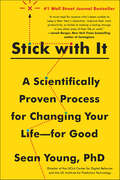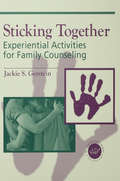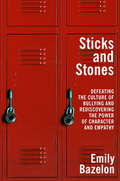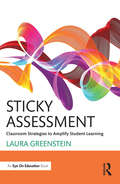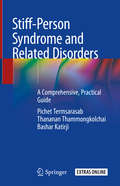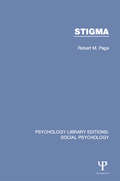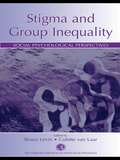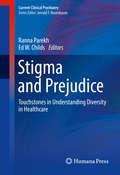- Table View
- List View
Stereotype in der Schule
by Sabine Glock Hannah KleenDas Buch liefert neue, in Deutschland noch relativ unbekannte Forschung zum Einfluss von Stereotypen in der Schule und einen hervorragenden theoretischen und empirischen Überblick zu dem Themenkomplex. Beschrieben und analysiert werden vor allem Stereotype im Kontext unterschiedlicher Merkmale von Schüler*innen wie Geschlecht, sonderpädagogischem Förderbedarf, Migrationsverhältnisse und sozio-ökonomischem Status.
Stereotypes During the Decline and Fall of Communism (International Series in Social Psychology)
by Gyorgy HunyadyUnique among the satellites of the Soviet Union, Hungary has data from a series of fourteen substantial surveys from the mid-1960s through to 1994. How do Hungarians think about themselves, their history, their society and other countries and their peoples? Hunyady provides an excellent summary of investigations examining these questions, analysing them against the background of the social psychology literature of stereotypes.
Stereotypes and Language Learning Motivation: A Study of L2 Learners of Asian Languages
by Larisa NikitinaThis book explores stereotypes that learners of six Asian languages— Japanese, Mandarin, Korean, Myanmar, Thai and Vietnamese—hold about the target language country, its cultures and people. Some of the findings, such as the language learners’ mental images of Myanmar, Thailand and Vietnam, are presented here for the first time. Recognizing that stereotypes, and attitudes embedded in them, have an impact on people’s actions and behavioural intentions, this book examines whether and how the country stereotypes held by the students influenced their motivation to learn the target language. Besides providing worthwhile insights into the content and structure of the country stereotypes and their relationship with language learning motivation, this book offers methodological and theoretical advancements. Drawing on intellectual heritage of Russian psychologist Lev Vygotsky (1896-1934) the book highlights how the concepts of word meaning (znachenie slova) and word sense (smysl) could be fruitfully employed in studies on stereotypes that people learning a foreign language hold about a target language country. This book will appeal to all readers interested in stereotypes that people have about foreign countries and also to educators and researchers who study language learning motivation.
Stereotypes and the Construction of the Social World
by Perry HintonStereotypes and the Construction of the Social World explores the complexity of stereotypes, guiding the reader through issues of definition and theoretical explanations from psychology and other disciplines. The book examines why people use stereotypes, which have often been represented as inaccurate, rigid and discriminatory. If that is what they are, then why would people employ such ‘faulty’ or ‘biased’ views of others? <p> Whilst this book presents a detailed and comprehensive analysis of the psychological research into the individual use of stereotypes, it also presents this research within its ideological and historical context, revealing the important sociocultural factors in what we mean by ‘stereotypes’. From the politics of representation and inter-group power relations, alongside individual social cognitive issues, the book provides a comprehensive and cross-disciplinary account of stereotypes and stereotyping.
Stereotypes, Cognition and Culture
by Dr Perry HintonWhat are stereotypes and why do we use them? Are all stereotypes bad? Can we stop people from using them? Questions such as these have fascinated social psychologists for many years.Perry Hinton provides an accessible introduction to this key area, giving a critical and concise overview of the influential theories and approaches, as well as insights into recent work on the role of language and culture in stereotyping.
Stereotypic Animal Behaviour: Fundamentals and Applications to Welfare
by Georgia Mason Jeffrey RushenAbnormal behavior patterns, from the jumping and somersaulting of caged laboratory mice to the pacing of enclosed 'big cats', are displayed by many millions of farm, zoo, research and companion animals. Including new chapters and over 30 contributors, this book focuses on the causation and treatment of these environment-induced stereotypic behaviors, and their implications for animal welfare and normalcy of brain functioning. The book begins by taking an ethological perspective, focusing on the constraints captivity places on animals' normal behavioral repertoires, and the effects these have on specific motivational systems. It then addresses the role of dysfunction, particularly the impact of chronic stress and impoverished environments on brain functioning. The book then moves on to explore how stereotypic behaviors can be tackled, once they have emerged, using diverse techniques from environmental enrichment to pharmaceutical intervention. It concludes by giving a new definition for 'stereotypic behavior', and a discussion of future research directions.
Stereotyping and Prejudice: Key Readings (Frontiers of Social Psychology)
by Charles Stangor Christian S. CrandallThis volume presents a contemporary and comprehensive overview of the great diversity of theoretical interests, new ideas, and practical applications that characterize social psychological approaches to stereotyping and prejudice. All the contributions are written by renowned scholars in the field, with some chapters focusing on fundamental principles, including research questions about the brain structures that help us categorize and judge others, the role of evolution in prejudice, and how prejudice relates to language, communication, and social norms. Several chapters review a new dimension that has frequently been understudied—the role of the social context in creating stereotypes and prejudice. Another set of chapters focuses on applications, particularly how stereotypes and prejudice really matter in everyday life. These chapters include studies of their impact on academic performance, their role in small group processes, and their influence on everyday social interactions. The volume provides an essential resource for students, instructors, and researchers in social and personality psychology, and is also an invaluable reference for academics and professionals in related fields who have an interest in the origins and effects of stereotyping and prejudice.
Stereotyping as Inductive Hypothesis Testing (European Monographs in Social Psychology)
by Klaus Fiedler Eva WaltherTraditional social hypotheses have a built-in tendency to verify themselves and so involuntarily resist attempts at stereotype change or correction. This is the insight demonstrated and discussed as the start point for an alternative approach to the problem of stereotyping and hypothesis testing. Stereotyping as Inductive Hypothesis Testing explicates the proposition that many stereotypes originate not so much in individual brains, but in the stimulus environment that interacts with and constitutes the social individual. This cognitive-ecological approach is then used to analyse the different aspects of language, sign systems and communication that can implicitly govern hypothesis testing procedures and lead to circular or reinforcing outcomes. The authors describe factors in tests such as judgment, memory and expectation and go on to suggest viable ecological learning approaches to them. An original research project based on a classroom situation is used to demonstrate and verify findings. The cognitive-ecological approach is then contextualised in relation to both the traditional approaches it can replace and the contemporary statistical sampling practices it can improve. Written with a profound understanding of the link between theoretical rigour and good empirical research practice this monograph will be invaluable to anyone with an interest in stereotyping or who wishes to enhance the reliability and self-awareness of their research methods.
Sterker dan schizofrenie
by Richard Carlson Jr. Audrey LiauwMijn verhaal over paranoïde schizofrenie, obsessieve-compulsieve stoornis, depressie, anosognosie, suïcide, en de behandeling en het herstel van ernstige geestesziekte
Stevens' Handbook of Experimental Psychology and Cognitive Neuroscience, Developmental and Social Psychology: Learning And Memory
by John T. Wixted Simona GhettiIV. Developmental & Social Psychology: Simona Ghetti (Volume Editor) (Topics covered include development of visual attention; self-evaluation; moral development; emotion-cognition interactions; person perception; memory; implicit social cognition; motivation group processes; development of scientific thinking; language acquisition; development of mathematical reasoning; emotion regulation; emotional development; development of theory of mind; category and conceptual development; attitudes; executive function.)
Stevens' Handbook of Experimental Psychology and Cognitive Neuroscience, Language and Thought
by John T. Wixted Sharon L. Thompson-SchillIII. Language & Thought: Sharon Thompson-Schill (Volume Editor) (Topics covered include embodied cognition; discourse and dialogue; reading; creativity; speech production; concepts and categorization; culture and cognition; reasoning; sentence processing; bilingualism; speech perception; spatial cognition; word processing; semantic memory; moral reasoning.)
Stevens' Handbook of Experimental Psychology and Cognitive Neuroscience, Learning and Memory: Learning And Memory
by John T. Wixted Elizabeth A. Phelps Lila DavachiI. Learning & Memory: Elizabeth Phelps & Lila Davachi (Volume Editors)Topics covered include working memory; fear learning; education and memory; memory and future imagining; sleep and memory; emotion and memory; motivation and memory; inhibition in memory; attention and memory; aging and memory; autobiographical memory; eyewitness memory; and category learning.
Stevens' Handbook of Experimental Psychology and Cognitive Neuroscience, Methodology
by Eric-Jan Wagenmakers John T. WixtedV. Methodology: E. J. Wagenmakers (Volume Editor) Topics covered include methods and models in categorization; cultural consensus theory; network models for clinical psychology; response time modeling; analyzing neural time series data; models and methods for reinforcement learning; convergent methods of memory research; theories for discriminating signal from noise; bayesian cognitive modeling; mathematical modeling in cognition and cognitive neuroscience; the stop-signal paradigm; hypothesis testing and statistical inference; model comparison in psychology; fmri; neural recordings; open science; neural networks and neurocomputational modeling; serial versus parallel processing; methods in psychophysics.
Stevens' Handbook of Experimental Psychology and Cognitive Neuroscience, Sensation, Perception, and Attention: Learning And Memory
by John T. Wixted John SerencesII. Sensation, Perception & Attention: John Serences (Volume Editor) (Topics covered include taste; visual object recognition; touch; depth perception; motor control; perceptual learning; the interface theory of perception; vestibular, proprioceptive, and haptic contributions to spatial orientation; olfaction; audition; time perception; attention; perception and interactive technology; music perception; multisensory integration; motion perception; vision; perceptual rhythms; perceptual organization; color vision; perception for action; visual search; visual cognition/working memory.)
Stick Figure: A Diary of My Former Self
by Lori Gottlieb"I wish to be the thinnest girl at school, or maybe even the thinnest eleven-year-old on the entire planet," confides Lori Gottlieb to her diary. "I mean, what are girls supposed to wish for, other than being thin?" For a girl growing up in Beverly Hills in 1978, the motto "You can never be too rich or too thin" is writ large. Precocious Lori learns her lessons well, so when she's told that "real women don't eat dessert" and "no one could ever like a girl who has thunder thighs," she decides to become a paragon of dieting. Soon Lori has become the "stick figure" she's longed to resemble. But then what? Stick Figure takes the reader on a gripping journey, as Lori struggles to reclaim both her body and her spirit. By turns painful and wry, Lori's efforts to reconcile the conflicting messages society sends women ring as true today as when she first recorded these impressions. "One diet book says that if you drink three full glasses of water one hour before every meal to fill yourself up, you'll lose a pound a day. Another book says that once you start losing weight, everyone will ask, 'How did you do it?' but you shouldn't tell them because it's 'your little secret. ' Then right above that part it says, 'New York Times bestseller. ' Some secret. " With an edgy wit and keenly observant eye, Stick Figure delivers an engrossing glimpse into the mind of a girl in transition to adulthood. This raw, no-holds-barred account is a powerful cautionary tale about the dangers of living up to society's expectations.
Stick Up for Yourself!: Every Kid's Guide to Personal Power and Positive Self-Esteem
by Lev Raphael Gershen KaufmanFully refreshed to address modern issues, this popular essential guide helps kids build self-confidence and assert themselves. <p><p>Using simple words and real-life examples, this book shows kids how to be assertive with other kids--and with adults. Kids will learn to feel better about themselves, stronger and more secure inside, and more in charge of their lives. They'll read about effective ways to deal with intense feelings and to build self-esteem and self-confidence. <p><p>In addition, they'll learn strategies for building inner security to cope with powerlessness and uncertainty and discover ways of protecting themselves when using social media.
Stick up for Yourself!: Every Kid's Guide to Personal Power and Positive Self-Esteem
by Lev Raphael Gershen Kaufman Pamela EspelandSimple words and real-life examples help kids build genuine self-esteem, assertiveness skills, responsibility, and relationships.
Stick with It: A Scientifically Proven Process for Changing Your Life—for Good
by Sean D. Young#1 Wall Street Journal BestsellerAn award-winning psychologist and director of the UCLA Center for Digital Behavior shows everyone how to make real, lasting change in their lives in this exciting work of popular psychology that goes beyond The Power of Habit with science and practical strategies that can alter their problem behaviors—forever.Whether it’s absent-minded mistakes at work, a weakness for junk food, a smart phone addiction, or a lack of exercise, everyone has some bad habit or behavior that they’d like to change. But wanting to change and actually doing it—and sticking with it—are two very different things.Dr. Sean Young, an authoritative new voice in the field of behavioral science, knows a great deal about our habits—how we make them and how we can break them. Stick with It is his fascinating look at the science of behavior, filled with crucial knowledge and practical advice to help everyone successfully alter their actions and improve their lives.As Dr. Young explains, you don’t change behavior by changing the person, you do it by changing the process. Drawing on his own scientific research and that of other leading experts in the field, he explains why change can be difficult and identifies the crucial forces that combine to make transformation permanent, from the right way to create new habits to how to harness emotional meaning to motivate change. He also helps us understand how the mind often interferes with creating lasting change and how we can outsmart it, including using "neurohacks" to shortcut the brain’s counterproductive instincts. In addition he provides a powerful corrective to the decades old science of habits, offering a next generation discussion of how habits can change behavior with the right approach.Packed with pragmatic exercises and stories of real people who have used them successfully, Stick with It shows that it is possible to control spending, stick to a diet, become more social, exercise regularly, stop compulsively checking e-mail, and overcome problem behaviors—forever.
Sticking Together: Experiential Activities For Family Counselling
by Jaclyn S. GersteinFirst published in 2000. Routledge is an imprint of Taylor & Francis, an informa company.
Sticks and Stones: Defeating the Culture of Bullying and Rediscovering the Power of Character and Empathy
by Emily BazelonBeing a teenager has never been easy, but in recent years, with the rise of the Internet and social media, it has become exponentially more challenging. Bullying, once thought of as the province of queen bees and goons, has taken on new, complex, and insidious forms, as parents and educators know all too well. No writer is better poised to explore this territory than Emily Bazelon, who has established herself as a leading voice on the social and legal aspects of teenage drama. In Sticks and Stones, she brings readers on a deeply researched, clear-eyed journey into the ever-shifting landscape of teenage meanness and its sometimes devastating consequences. The result is an indispensable book that takes us from school cafeterias to courtrooms to the offices of Facebook, the website where so much teenage life, good and bad, now unfolds. Along the way, Bazelon defines what bullying is and, just as important, what it is not. She explores when intervention is essential and when kids should be given the freedom to fend for themselves. She also dispels persistent myths: that girls bully more than boys, that online and in-person bullying are entirely distinct, that bullying is a common cause of suicide, and that harsh criminal penalties are an effective deterrent. Above all, she believes that to deal with the problem, we must first understand it. Blending keen journalistic and narrative skills, Bazelon explores different facets of bullying through the stories of three young people who found themselves caught in the thick of it. Thirteen-year-old Monique endured months of harassment and exclusion before her mother finally pulled her out of school. Jacob was threatened and physically attacked over his sexuality in eighth grade--and then sued to protect himself and change the culture of his school. Flannery was one of six teens who faced criminal charges after a fellow student's suicide was blamed on bullying and made international headlines. With grace and authority, Bazelon chronicles how these kids' predicaments escalated, to no one's benefit, into community-wide wars. Cutting through the noise, misinformation, and sensationalism, she takes us into schools that have succeeded in reducing bullying and examines their successful strategies. The result is a groundbreaking book that will help parents, educators, and teens themselves better understand what kids are going through today and what can be done to help them through it.Praise for Sticks and Stones "Immersive storytelling with a sturdy base of science underneath, [Sticks and Stones] draws its authority and power from both."--New York"Thoughtful and moving, incisive and provocative, Sticks and Stones is essential reading for any educator trying to negotiate the minefield of bullying. Packed with valuable advice, the book brings a welcome dose of sanity to an often overheated national discussion."--Paul Tough, author of How Children Succeed "Beautifully written and tenaciously reported, Sticks and Stones is a serious, important book that reads like a page-turner. Emily Bazelon is a gifted writer, and this powerful work is sure to place childhood bullying at the heart of the national conversation--right where it belongs."--Susan Cain, author of Quiet "Emily Bazelon is doing the most honest, hard-hitting investigative work on bullying in America today. Sticks and Stones is a page-turner, combining compelling personal stories, rigorous reporting and practical advice for parents and educators. Read it: It's essential."--Rachel Simmons, author of Odd Girl OutFrom the Hardcover edition.
Sticky Assessment: Classroom Strategies to Amplify Student Learning
by Laura GreensteinSticky Assessment is a straightforward guide to assessment, designed to demystify assessment and to give teachers the tools they need become better assessors. Translating the latest research into a concise and practical volume, this book helps teachers to monitor student learning, make assessment engaging and meaningful for students, and to use assessment that improves rather than merely measures learning outcomes. With examples from classroom teachers and exercises designed to help teachers think through their processes, this book will be an invaluable and lasting resource for classroom teachers.
Stiff-Person Syndrome and Related Disorders: A Comprehensive, Practical Guide
by Bashar Katirji Pichet Termsarasab Thananan ThammongkolchaiThis comprehensive title covers all of the broad aspects of stiff-person spectrum disorders (SPSD), ranging from clinical features and laboratory investigations to the basic scientific roles of neuroimmunology and genetics that aid clinicians in understanding the pathogenesis of this disorder.Organized across 15 chapters, this highly practical book begins with a thorough account of the history and clinical phenomenology of SPSD. Subsequent chapters then delve into the differential diagnoses of the disorder, as well as its electrophysiology, immunopathogenesis, and neurochemistry. Following this is an analysis of each subtype of SPSD including classic stiff-person syndrome and its variants, correlations between clinical phenotypes and antibodies, as well as SPSD in the pediatric population. Finally, the book concludes with an examination of the various SPSD diagnostic approaches, treatments, and potential emergencies seen in clinical practice.Developed by a renowned multidisciplinary authorship, Stiff-Person Syndrome and Related Disorders is an indispensable contribution to the clinical literature and will be of great interest to both clinicians and basic science researchers.
Stigma (Psychology Library Editions: Social Psychology)
by Robert M. PageAlthough references to stigma were commonplace in the field of social policy and elsewhere, the concept was often used in a rather imprecise way. Originally published in 1984, this book assesses the relevance of the concept of stigma for the study of social policy. Investigations of the concept within the welfare field have tended to be far too narrow in focus (i.e. the concept has been regarded as a technical problem which can be eradicated by greater adherence to the principle of universalism). As a counter to this perspective, Robert Page argues that it is necessary to distinguish much more clearly between various aspects of the concept of stigma (e.g. stigmas, stigmatization and felt stigma). He examines the reasons why, and the ways in which, one particular ‘welfare’ group – unmarried mothers – have been stigmatized over the centuries in order to highlight the importance of examining existing patterns of ‘welfare’ and other forms of stigmatization within their political, economic, social and historical context. It is concluded that stigma will continue to be a key concept for both students and practitioners within the field of social policy provided that it is examined from this wider perspective.
Stigma and Group Inequality: Social Psychological Perspectives (Claremont Symposium on Applied Social Psychology Series)
by Shana Levin Colette Van LaarThis book provides a snapshot of the latest theoretical and empirical work on social psychological approaches to stigma and group inequality. It focuses on the perspective of the stigmatized groups and discusses the effects of the stigma on the individual, the interacting partners, the groups to which they belong, and the relations between the groups.Broken into three major sections, Stigma and Group Inequality:*discusses the tradeoffs that stigmatized individuals must contend with as they weigh the benefits derived from a particular response to stigma against the costs associated with it;*explores the ways in which environments can threaten one's intellectual performance, sense of belonging, and self concept; and*argues that the experience of possessing a stigmatized identity is shaped by social interactions with others in the stigmatized group as well as members of other groups.Stigma and Group Inequality is a valuable resource for students and scholars in the fields of psychology, sociology, social work, anthropology, communication, public policy, and political science, particularly for courses on stigma, prejudice, and intergroup relations. The book is also accessible to teachers, administrators, community leaders, and concerned citizens who are trying to understand and improve the plight of stigmatized individuals in school, at work, at home, in the community, and in society at large.
Stigma and Prejudice
by Ranna Parekh Ed W. ChildsIn this innovative title, the authors describe unique patient populations affected by stigma and prejudice and the prevalence of these issues to all healthcare providers. Each chapter covers the forms of prejudice and stigma associated with minority statuses, including religious minorities, the homeless, as well as those stigmatized by medical serious medical conditions, such HIV/AIDS, obesity, and substance misuse disorders. The chapters focus on the importance of recognizing biological differences and similarities within such groups and describes the challenges and best practices for optimum healthcare outcomes. The text describes innovative ways to connect in a clinical setting with people of diverse backgrounds. The text also covers future directions and areas of research and innovative clinical work being done. Written by experts in the field, Stigma and Prejudice is an excellent resource for psychiatrist, psychologists, general physicians, social workers, and all other medical professionals working with stigmatized populations.
